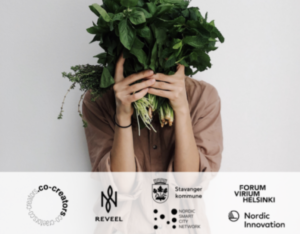
This collaborative pilot project uses digital infrastructure (marketplace and pick-up points) to strengthen the position of local food producers and to make local food more accessible to consumers in the Stavanger-region.
Name of organisation | Stavanger Kvikktest/Agile Piloting – ‘Pick-me-up’ |
|---|---|
Year established | 2021 |
Website | https://www.stavanger.kommune.no/samfunnsutvikling/smartbyen-stavanger/smartby-prosjekter/barekraftige-nabolag |
Location | Stavanger East / Storhaug, Norway |
Type of organisation | Municipality |
Keywords | Digital Technology, collaborative short food supply chain |
Thematic focus | Digital Innovations |
What is “Pick-me-up” Stavanger?
Pick-me-up is part of larger project called Healthy Liveable Neighborhoods in which the cities of Stavanger (Norway), Helsinki (Finland), Vantaa (Finland), Kristiansand (Norway) and Copenhagen (Denmark) participate. Pick me up is the Stavanger-pilot of the project.
Pick-me-up aims to make local food more accessible to consumers in the Storhaug neighborhood in Stavanger. The initiative involves the use of digital technologies to create new marketplaces that reduce the distance between local food producers and consumers. The objective is to a) strengthen the position of local food producers and b) bring a larger variety of sustainable local products to the market.
Who does “Pick-me-Up” work with and how do they do it?
The project was initiated by City of Stavanger, who organised an open innovation competition whereby potential suppliers were invited to come up with a solution based on a specific challenge: ‘Bridging the gap between local producers and consumers’. Two suppliers (Reveel and Co-creators) were chosen to collaborate on a solution and received a grant to develop ‘pick me up’ together with their partners.
Pick-me-up is carried out as an agile pilot project, so it is highly development oriented, with a focus on testing, learning, trial and error and optimisation. It has been tested in the Storhaug district of Stavanger which is located just southeast of the city centre and has a growing food district. The neighborhood is home to around 17 000 people.
With oversight from City of Stavanger, Reveel and Co-creators have operational responsibility for the project and lead the innovation process. The two actors are working on the challenge together. Co-Creators explore the most suitable pickup points for local products and create awareness among people about the impact of their daily choices. They also seek to identify the challenges associated with selling/buying local food and to create new synergies and new local food business opportunities. Reveel, in turn, makes local food products available for consumers in a safe and accessible way. By combining Reveel’s business model and technology with Co-Creators’ service design approach, the aim is to tackle the barriers of selling and buying local food in the area.
Local Safari, Brimse Gaard and Ryfylkehage are also engaged as sub-suppliers; these actors are private companies, local food producers and farmers.
Other actors supporting the overarching ‘Healthy Liveable Neighbourhoods’ project include: Forum Virium Helsinki, City of Stavanger, Nordic Innovation and Nordic Smart City Network.
Some key advantage with the way the initiative is organised is:
- The complete value chain is involved in the project
- Partners are specialised and contribute with their expertise on certain areas like marketing, digital solution, food (including issues concerning preservation, demands, etc.)
- The agile pilot allows for higher risks than what would usually be the case when it comes to public expenditure
- The testing/development orientation of the project implies a high degree of documentation and learning
What are the project’s main challenges?
The project holder (City of Stavanger) has limited control and decision-making power on a day-to-day basis within the project.
Additionally, while the project is creating new opportunities and collaborations, it is uncertain what will happen with the pick-up service when the project and pilot funding ends. This is a challenge to be addressed over the course of the project.
What are the priorities for the Pick –me up Project?
The project has also revealed a number of areas that could be addressed to strengthen the market position for local small-scale farmers. These include: availability of local food; closer collaboration with restaurants in the region; increased awareness of how small-scale farmers operate in terms of seasonal variations, production capacity, etc..
The initiative seeks to have positive economic and social impacts for farmers and citizens alike. The farmers involved in this initiative add value to their product and control the entire process, from production to sale, with the exception of slaughter. Similarly, consumers have access to quality products in a short food supply chain, which they can buy at a reasonable cost given the absence of intermediaries.
The beneficiaries of the collective catering service also have access to quality products from the region. The workshop is thus part of a global approach to ensure education and healthy, quality food for all.
